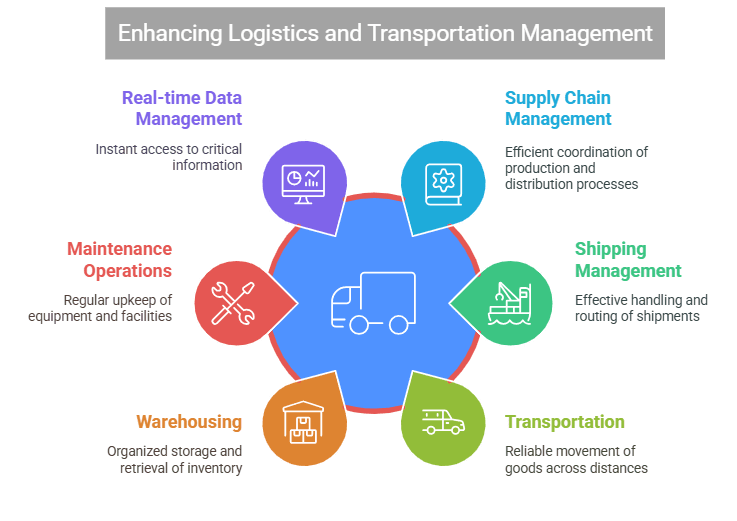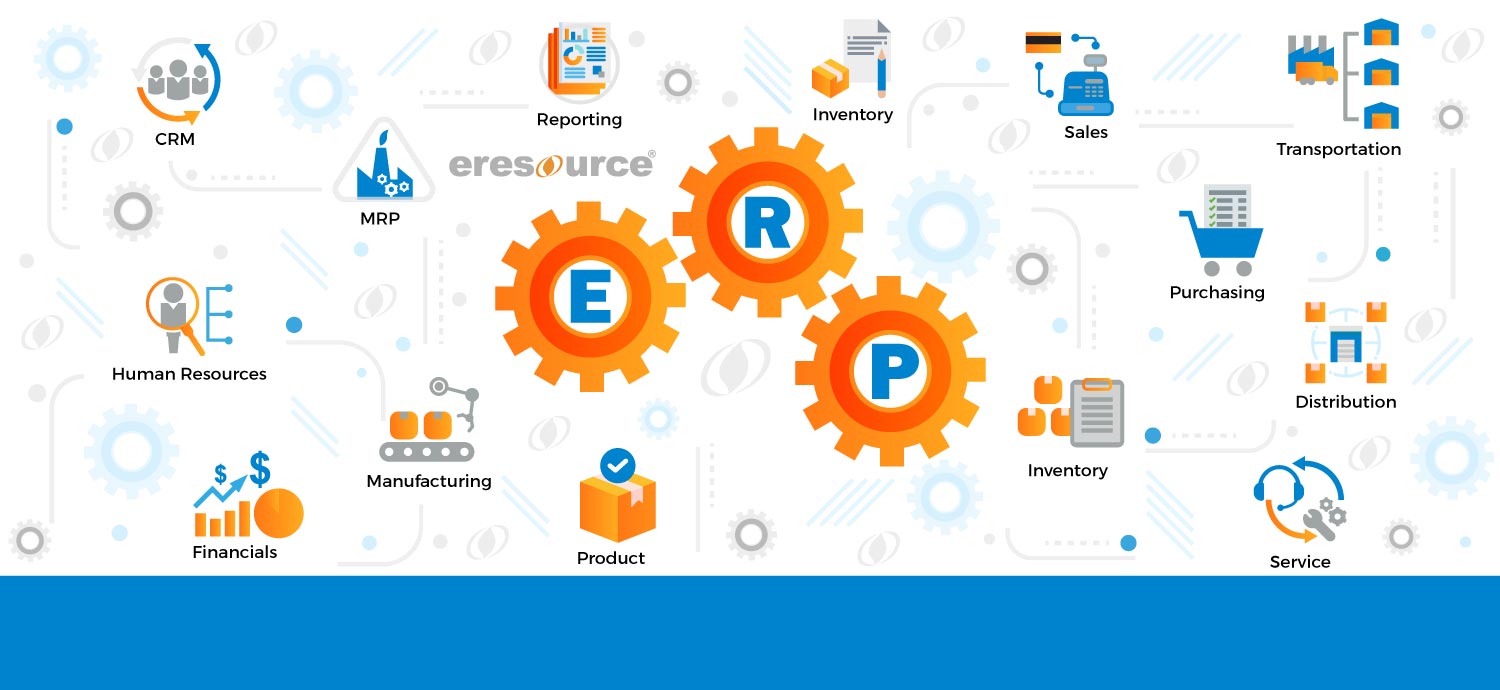Any business that frequently interacts with multi-echelon global supply chains must have a robust logistics department. It calls for high proficiency in supply chain management, shipping management, transportation, warehousing, storage, and maintenance operations while handling large volumes of real-time data.

Thankfully, while working with wholesale trade or distribution, an ERP system may help you manage your logistics and transportation better. Using integrated business systems, daily tasks including accounting, human resources (HR), and customer relationship management (CRM) can be automated. Managing your company’s inventory and supply chain can also enhance logistics and transportation.
ERP benefits of logistics and transportation
Here are the top seven ways that ERP software helps quicken logistical and transportation processes:
Optimized inventory management
Having total control over inventory is one of the most critical duties in ensuring seamless operations in logistics and transportation.
The inventory management module records all the details about the goods your business manufactures, purchases, manufactures, stores, or sells. You can adjust product pricing depending on current sales trends or changes in manufacturing costs, which streamlines the process.

Furthermore, to locate and identify things within a warehouse and maintain stock levels as efficiently as possible, eresource 3GL transport ERP software with traceability technologies can use barcodes, serial numbers, lot numbers, or sophisticated RFID tracking.
Real-time data enables prompt notification of out-of-stock items, arriving orders, outgoing orders that need care, and any delivery problems.
Ultimately, having complete knowledge of inventory status enables leaders and managers in the logistics sector to decide more quickly and effectively when dispatching or placing orders.
Also Read – Construction ERP Software
Better distribution management
Because it entails the appropriate administration of the distribution flow and control over the transportation of goods, the distribution side of the logistics organization is one of the essential business components.
All distributors, suppliers, shipping partners, and retailers can obtain comprehensive shipment information using eresource 3 GL ERP for transportation industry. They can monitor delivery zones, orders, inventories, and payments and ensure efficient distribution management.

ERP software may control the movement of commodities for transportation purposes, ensuring that customers and suppliers fulfil their orders on time. Direct communication between drivers and coordinators is also made possible by the system, which sends real-time traffic reports, customer addresses, and any emergency information, like information about transportation problems.
Enhanced staff management
Managing employees may be highly challenging, particularly in a logistics company where employees may be dispersed across the nation or the globe. However, managing personnel is simple with an ERP system in place. Leaders can receive ready-made reports on employee performance using the critical performance indication function incorporated into the program, which enables them to make better workforce decisions.

Real-time shipment tracking
Better planning and route optimization for shipments are benefits of adopting the eresource 3GL ERP for transportation and delivery management tools. For instance, you might discover a quicker way to ship goods that can save you money and time and yield a more significant ROI over time.
Additionally, the real-time tracking feature enables shippers or distributors to connect directly with delivery personnel, view the vehicle’s current location, and more. As a result, the company’s whole customer service system eventually improves, and leaders are better prepared to create business plans.
Also Read – Manufacturing ERP Software
Faster order fulfilment
ERP software can also assist logistics and transportation organizations in completing their orders more quickly by locating bottlenecks, minimizing delays through real-time tracking, and decreasing order errors.
Additionally, items that buyers have requested can be quickly located in several warehouses and processed using a single system. This will significantly aid in preserving consumer contentment.
Accurate financial reporting
Financial reporting may allow you to gain more transparency in your logistics operations. An ERP system’s accounting module can monitor revenues and outlays in the general ledger to maintain a balance between accounts payable (AP) and accounts receivable (AR).
Based on your chosen region, location, profit centre, employee, or other critical performance metrics, automated reports slice and dice the data (KPIs).
Decision-makers in the supply chain can use this data to develop more precise and nuanced logistical procedures. For instance, they can determine the reasons for lost profits and then plan how to make up for the issue.
Improved data management
Not to mention that logistics ERP software can manage data without human errors. You can use it to view and collect crucial data, such as consignment records, production expenses, and shipping tax. Additionally, this system is capable of applying and processing logistics regulatory compliance procedures. Businesses can make informed decisions and keep their data safer in the cloud by using centralized databases.
Conclusion
Overall, you can speed up your quest for maximum earnings thanks to the cutting-edge features and advantages you get from integrating an ERP system into your logistics and transportation operations sector.
Your firm will be more profitable the more efficient your operations are. Also, remember that, given the increasingly ferocious rivalry in the logistics market, being prone to ERP integration delays might cost you dearly. Start implementing the automated solution of eresource 3GL ERP software as a result right away.
Recent Posts
- Time to implement AI-enabled No code eresource ERP system for your industry

- Cloud-based ERP with Artificial intelligence (AI) capabilities holds the key to successful corporate processes in 2025

- No-Code ERP Software: How Businesses Can Customize Without Coding Expertise

- Don’t go over budget! The cost of a need-based ERP system is affordable

- eresource brings best AI-enabled No Code ERP system for warehouse and logistics management

- AI improves ERP software by enabling more intelligent automation

Categories
Register for Free Demo!
Recent Post
-

eresource ERP 360 - an
11th Apr 2019 -

A competitive ERP system for
17th Apr 2019 -

Auto components manufacturing industry has
17th Apr 2019 -

Make the best use of
17th Apr 2019













